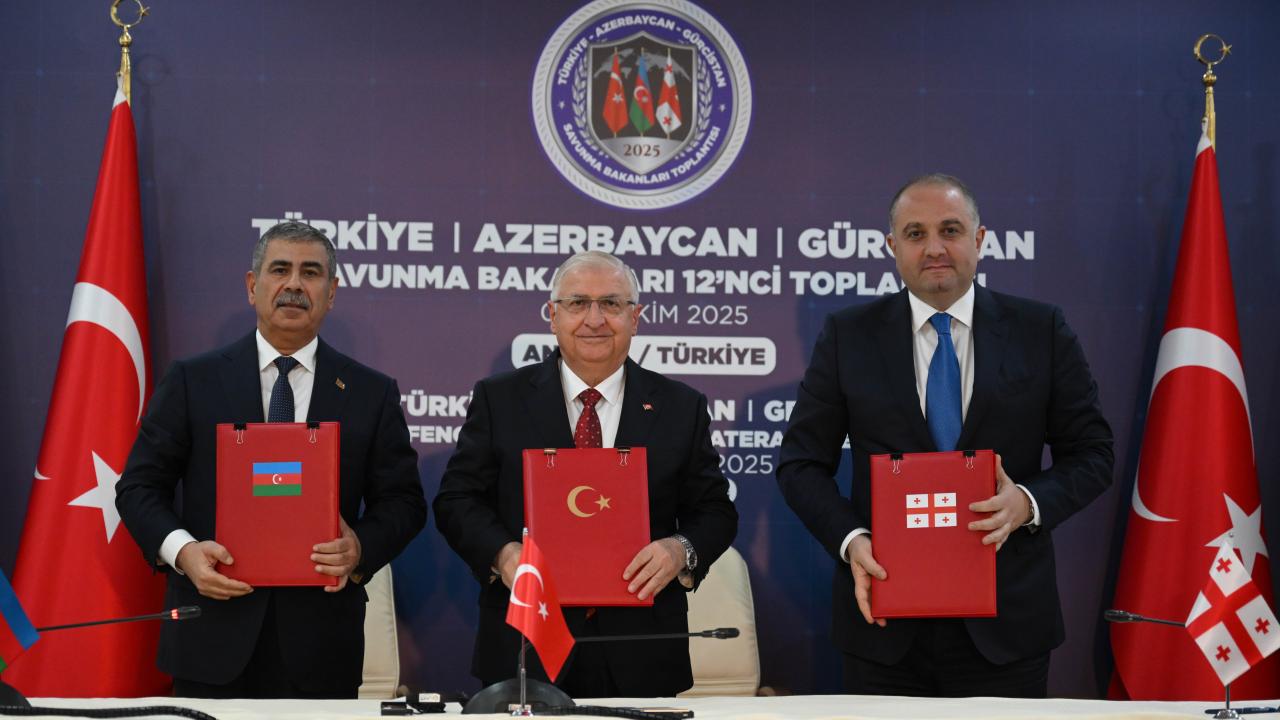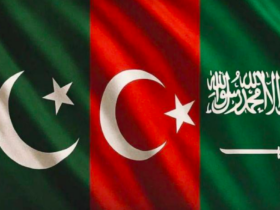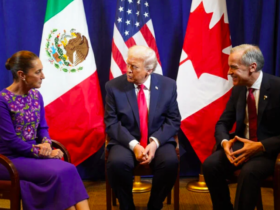Azerbaijani Member of Parliament Babaoglu and military expert Ramaldanov on the recent Turkish-Georgian-Azerbaijani defense summit.
Azerbaijani Member of Parliament Babaoglu and military expert Ramaldanov on the recent Turkish-Georgian-Azerbaijani defense summit.
By Tehran Tapdigov, from Baku / Azerbaijan
On October 9, the defense ministers of Türkiye, Azerbaijan, and Georgia met in Ankara, Türkiye. During the meeting, bilateral and trilateral agreements were signed to enhance regional security.
The signed agreements are also characterized as strengthening Türkiye’s military presence in the South Caucasus. So, what will the process look like from here? What advantages does Türkiye’s military presence in the South Caucasus indicate?
We discussed the topic with Azerbaijani MP Hikmet Babaoglu and Azerbaijani military expert Shair Ramaldanov.
First, note that on October 7, 2025, at the summit of the Organization of Turkic States (OTS), Azerbaijani President Ilham Aliyev proposed that joint military exercises of the OTS member countries be held in Azerbaijan in 2026. Turkish President Recep Tayyip Erdoğan and other presidents of the member states also attended the summit. Earlier, in August 2025, Ilham Aliyev had already spoken about the necessity of being ready for war at any moment.
MP Hikmet Babaoglu believes that in the context of the emerging new balance of power globally, the efforts of Azerbaijan and Türkiye are causing a completely different security architecture to emerge in the South Caucasus. After Azerbaijan’s historic Victory in 2020, within just one year the Shusha Declaration was signed between Azerbaijan and Türkiye. This document was not only a military victory, but also a crucial legal agreement ensuring the continuity of political and diplomatic cooperation.
“Thus, for the first time since the arrival of the Caucasus Islamic Army in Azerbaijan in 1918, Türkiye has obtained political and military presence in the region again on a legal basis. This had great historical and strategic importance. A hundred years after the Ottoman Empire withdrew from the region, Türkiye’s regain in influence in the South Caucasus marked the beginning of an entirely new phase for the region. Of course, before this process there had already been various security measures, military cooperation, and bilateral exercises among Azerbaijan, Georgia, and Türkiye. But the main difference now is that this cooperation is developing in alignment with NATO’s regional security policy and has acquired an institutional character.”
Hikmet Babaoglu adds that since 2021, this cooperation has entered a new stage. The Türkiye–Azerbaijan tandem already holds a leading position in the regional security system, and Georgia’s joining this format contributes to forming a more stable and flexible security model in the South Caucasus.
“As relationships between Georgia and Türkiye proceed under the framework of NATO, the trilateral cooperation of Azerbaijan–Georgia–Türkiye is becoming one of the cornerstones of stability in the region both economically and military-strategically. At the same time, the joint activity of Türkiye and Azerbaijan is no longer limited to the South Caucasus. This cooperation concept creates a broad geographical “umbrella” of new security and economic integration stretching from Central Asia through the Caspian Basin and the Black Sea to the Mediterranean. In this respect, the works carried out under the Organization of Turkic States and the decision made at the summit in Gabala on the “Joint Sustainable Platform” (JSP) are of particular importance. This platform envisages in the future including Kyrgyzstan, Tajikistan, and other states in regional security and economic integration.”
The MP also stated that at the present stage, the legal and military-political consolidation of Türkiye–Georgia–Azerbaijan relations allows for the creation of a more reliable security umbrella. In this cooperation, Azerbaijan’s role stems from the strategic alliance between Türkiye and Azerbaijan, while Georgia’s role arises from its unique geographical location. Georgia functions as a bridge between the South Caucasus and Türkiye, connecting the economic, military, and logistic systems of the region.
“As Azerbaijan has been able to carry out its energy and transport projects — such as Baku–Tbilisi–Ceyhan, Baku–Tbilisi–Kars — through Georgia, now a similar model is forming in the sphere of security. Georgia’s participation in this architecture carries indispensable significance for both geographical and strategic reasons for Azerbaijan and Türkiye. The third pillar of the security architecture in the South Caucasus could be Armenia. For the security system constructed by Türkiye, Azerbaijan, and Georgia to be fully formed, Armenia’s involvement in the process at a certain level appears necessary. However, it should be considered that Armenia has for years been one of the main sources of security risk in the region. Therefore, its inclusion in this new system is possible only within the framework of mutual trust, legal obligations, and international guarantees. Otherwise, this integration could bring new risks.”
Currently, the aim of Azerbaijan and Türkiye is precisely this – to place their relations on a legal basis, ensure the opening of the Zangezur corridor, and create new communication lines in the region. If the Armenian parliament ratifies the relevant documents and unimpeded passage is ensured, this will be of extremely strategic importance for Türkiye and Azerbaijan. Because this corridor will become a unifying artery of the Turkic world.
Nevertheless, foreign factors also play a serious role in this process. Two major powers in the region — Russia and Iran — still retain their capacities to influence the geopolitical situation in the South Caucasus. They sometimes respond to Türkiye’s growing role in the region with competition and jealousy. Babaoğlu adds that for this reason, as Azerbaijan and Türkiye shape the new balance of power, they must conduct a balanced policy both regionally and globally.
“At the same time, the joint military exercises and security measures carried out on the initiative of these two countries are being closely observed by both Russia and Iran and in some cases accompanied by attempts at pressure. Preventing these pressures will depend directly on Türkiye’s diplomatic flexibility, strategic influence, and political will. We believe that brotherly Türkiye will successfully fulfill this historic mission — namely, the transformation of the South Caucasus into a zone of peace, security, and development. This is not just a political and military process but also a cultural and civilizational turning point. The new balance of power emerging in the South Caucasus strengthens the unity of the Turkic world, opens up new opportunities for regional stability, economic progress, and mutual trust for the future.”
Azerbaijani military expert Shair Ramaldanov also believes that the meeting of the defense ministers of Türkiye, Azerbaijan, and Georgia is a planned and traditional gathering. Such meetings take place every year and serve to strengthen mutual cooperation and coordination among the three countries. It is known that energy and logistics corridors — including oil, gas, and transport lines — pass precisely through these three countries.
“Today, in a period when international terrorism and instability are on the rise, and risks are expanding globally, the security of energy carriers and logistics networks has special importance. Historical and recent events show that terrorist groups and other destructive actors may target energy infrastructure. Therefore, to protect this field, trilateral defense coordination is essential. Türkiye’s security concerns and the safeguarding of energy routes are of strategic significance. The discussions among the defense ministers of Türkiye, Azerbaijan, and Georgia evaluate the newly emerged situation, identify potential risks, and explore ways to agree on concrete steps, short-term plans, and legal documents to counter these risks. This is carried out via formal decisions, joint exercises, and practical coordination.”
Ramaldanov added that annual joint military exercises and exchange of experience programs serve to strengthen the region’s defense capability, ensure the resilience of energy and logistics lines, and form a joint response to potential threats. The purpose of these exercises is to reinforce the security of the South Caucasus.
“At the same time, high-level summit meetings held in Azerbaijan under the umbrella of the Organization of Turkic States — including the participation of President Recep Tayyip Erdoğan — once again confirmed the importance of unity and cooperation of the Turkic world. In these events, the principle “a Turk has no friend but another Turk” is underscored: Turkic states should support one another politically, militarily, economically, and culturally. In the current geopolitical circumstances, risks arising in the South Caucasus and Central Asia also threaten the Turkic states. That is why it is strategically necessary that the Organization of Turkic States be stronger and united in the future. President Ilham Aliyev’s call to be “ready for war at any moment” also stems from this reality. No one can globally predict where or when conflict will break out. To preserve peace, it is vital to be strong, to guarantee defense capability, and to be ready to respond immediately to possible aggression.”
The principle ‘if you want peace, prepare for war’ is relevant in this context: if you are strong, you can protect your interests and independence. Turkish experts believe that the Turkic brother countries, united as a fist, must both ensure the region’s security and coordinate protection of energy and logistics infrastructure. This is not only military-political cooperation but also requires joint economic and diplomatic efforts.

















Leave a Reply